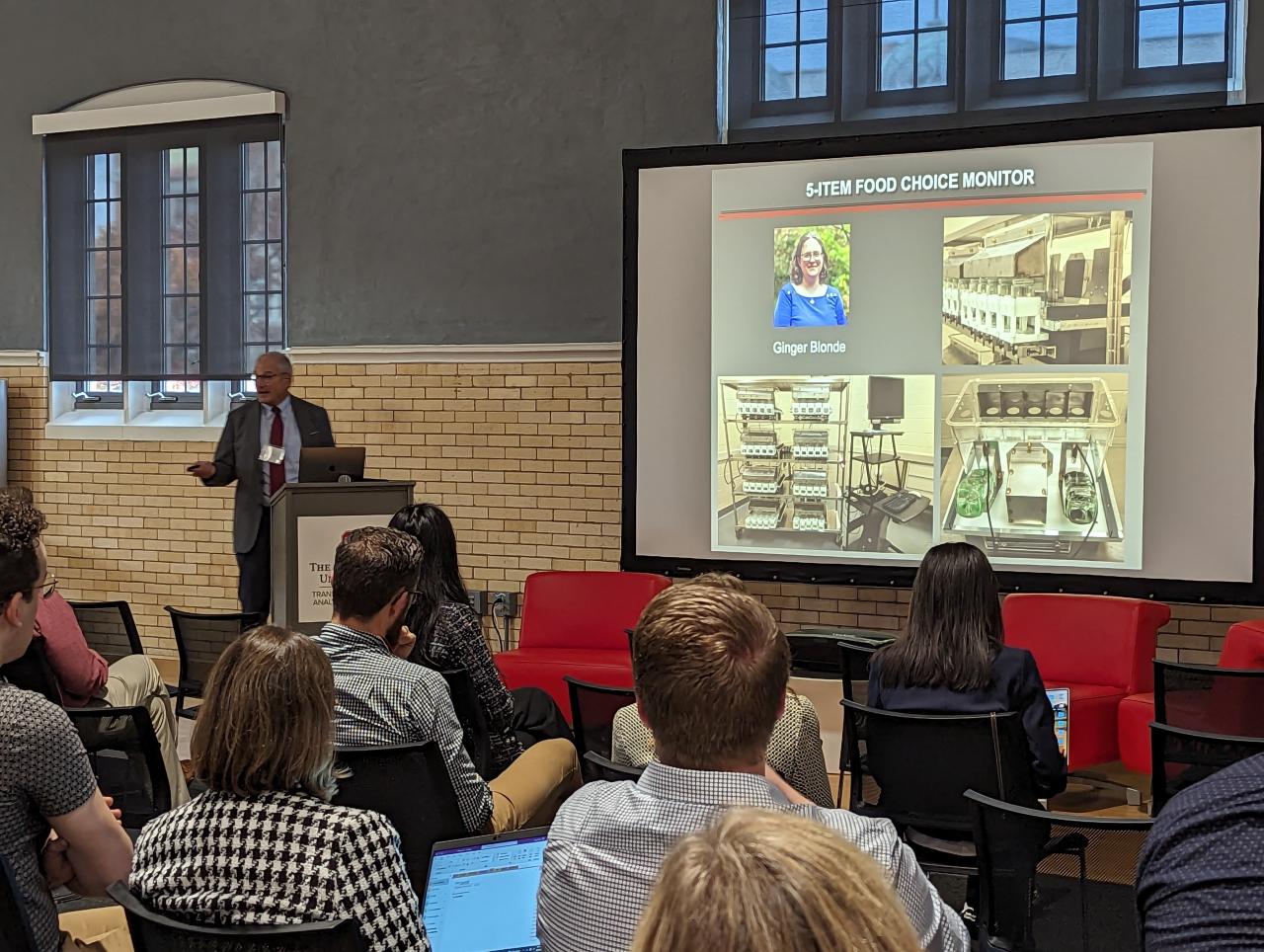To improve dietary patterns, we must understand the biological, environmental, and food-based cues that influence what, when, and how we eat. In an effort to build this focus on campus, the Foods for Health Research Initiative hosted an inaugural summit on sensory nutrition and ingestive behaviors on October 25, 2023. The full-day event featured Dr. Alan Spector from Florida State University as the keynote speaker and panel presentations from OSU researchers. Some key takeaways are summarized below. If you are interested in engaging with FFH around this topic visit the FFH Sensory Nutrition and Ingestive Behaviors webpage or contact FFH staff at FFH@osu.edu
Food intake is not a behavior in and of itself, it is the outcome of behavior
In the keynote address, Dr. Alan Spector discussed how modifications of the gastrointestinal tract, namely gastric bypass surgery and nerve transections, affect ingestive behaviors. His work in rodents and humans demonstrates the importance of studying not only the quantity of food consumed but also how food is consumed. For instance, rats that received Roux-en-Y gastric bypass surgery consumed the same number of meals as control rats, but those meals were smaller and demonstrated a clear preference for non-sugar carbohydrates and protein. In a live-in research setting, humans exhibited similar meal patterning and decreased energy intake but no shift in macronutrient preferences following the same surgical procedure. Results like these emphasize the importance of translational models for understanding the basic biology of ingestive behaviors.
Nutrient sensors exist along the gastrointestinal tract and can drive behavior
Drs. Susan Travers (College of Dentistry, Division of Biosciences), George Kyriazis (College of Medicine, Dept of Biological Chemistry and Pharmacology), and Lihua Ye (College of Medicine, Dept of Neuroscience) spoke on the neurobiology of ingestive behaviors. Dr. Travers discussed how sweet taste is a strong motivator of eating across species, and the main way it is perceived is through the action of sweet taste receptors. However, even mice without sweet taste receptors can develop a preference for sweet substances, indicating alternate mechanisms for nutrient sensing that drive behavior. Dr. Kyriazis then discussed the role of sweet taste receptors as nutrient sensors in the gut that help regulate physiological processes, like glucose absorption, and the consequences of variations in taste receptor genes. Dr. Ye rounded out the panel by discussing the active role the gut microbiota may play in ingestive behavior. Her data in zebrafish show that certain bacteria produce metabolites that promote feeding behavior via the gut-brain axis.
Many factors affect food choice and eating in humans
Animal models provide valuable insight into biological mechanisms that may influence feeding behaviors, but we humans are complex creatures. In the second panel discussion of the day, Drs. Devin Peterson, Chris Simons (College of Food, Ag, and Environmental Sciences, Department of Food Science and Technology), Colleen Spees, and Chris Taylor (School of Health and Rehabilitation Sciences) spoke on motivators of human behavior related to food choice and eating. While price, accessibility, and healthfulness are factors in food selection, people worldwide tend to eat foods with optimal flavor. Dr. Peterson discussed the opportunity flavor chemistry presents to encourage the adoption of healthy dietary patterns. Dr. Simons then discussed the importance of intrinsic food properties (e.g. brand size, certifications, etc) and extrinsic factors (e.g. eating environment) in food choice. Dr. Spees presented on attitudes and behaviors towards healthy eating, as well as approaches that have been used to understand and motivate behavior changes on an individual level. Dr. Taylor finished the day by discussing population-level patterns in ingestive behavior and their relation to core health issues facing Americans.
Research staff and trainees from the Ye, Townsend, Peterson, and Simons labs presented posters further showcasing the breadth of research being done in this area at Ohio State. Congratulations to Irene Wang (Peterson Lab), Thomas Reis (Simons Lab), and Gilian Gunsch (Townsend Lab) for being voted the top three posters of the event.
Next Steps from FFH
FFH Lead for Research Strategy and Development, Dr. Matt Teegarden, announced a new funding opportunity at the event. Up to three $7,500 ACTIVATE grants will be available on a rolling basis over the next year for researchers interested in starting or furthering existing activities within the topic of sensory nutrition and ingestive behaviors. Learn more here and keep an eye out for future FFH research summits.
